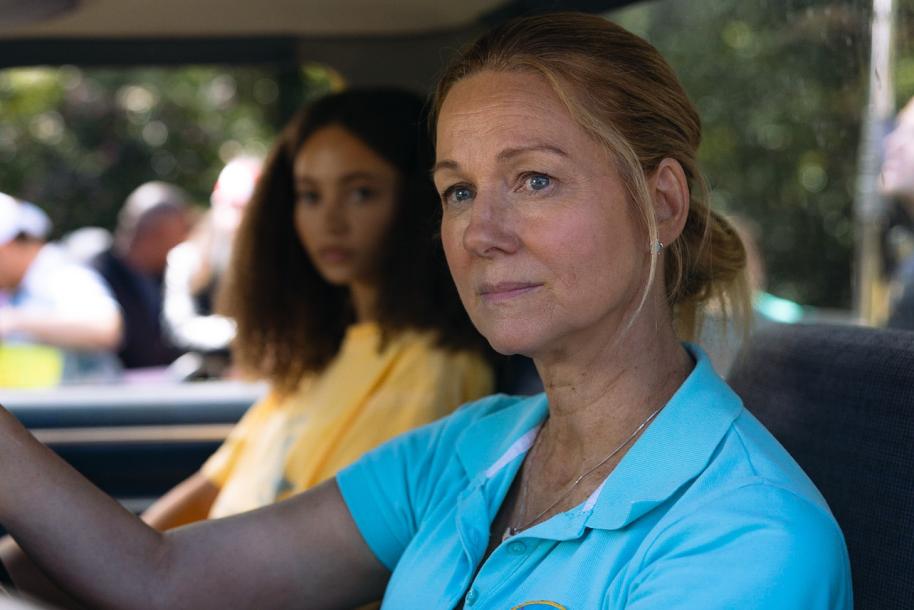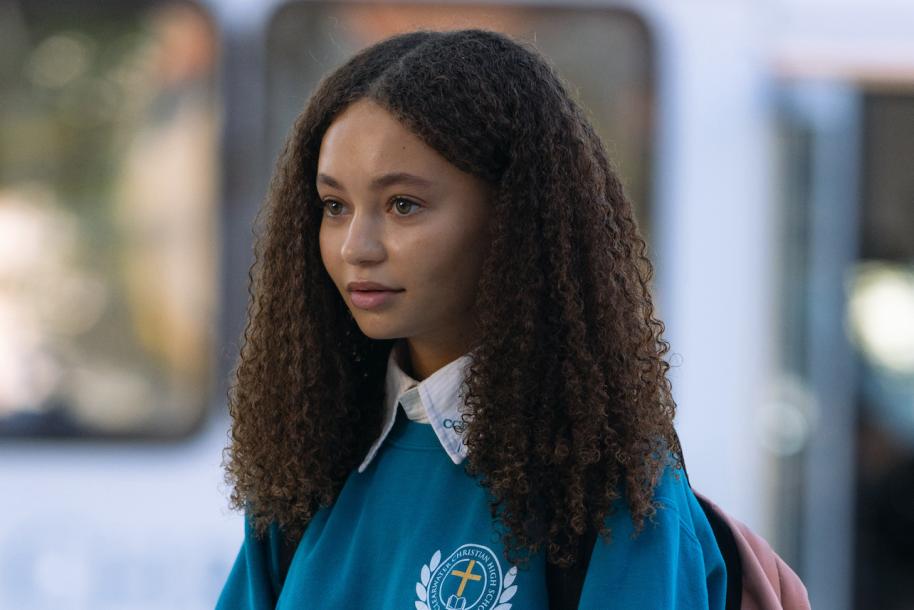More On:
Laura Linney
-
Stream It Or Skip It: ‘The Miracle Club’ on Netflix, an Irish Dramedy Powered by a Talented Cast
-
Is ‘Suncoast’ Based on a True Story? What to Know About Max Kenneth Chinn and The Infamous Terri Schiavo Case
-
’Suncoast’s Devastating Hospital Scene Proves Nico Parker Is More Than Just Thandiwe’s Newton Daughter
-
Laura Linney’s Oscar Campaign for Hulu’s ‘Suncoast’ Starts Now
Suncoast (now streaming on Hulu) is set a couple decades back, when the world was divided on the Terri Schiavo case: She was a Florida woman in a persistent vegetative state whose husband wanted to respect her wishes and remove her feeding tube so she could die, while her parents wanted to keep her alive; when the story became public, opinions on the case were divided (somewhat predictably) along culture-war political lines. It’s against this backdrop that writer/director Laura Chinn sets her loosely autobiographical dramedy, starring Nico Parker (of Dumbo remake fame, and the daughter of Thandiwe Newton) as a teenager contending with the stress of coming of age while her brother lies in bed, dying of cancer. Laura Linney and Woody Harrelson fill out the supporting cast for a film that comes from an earnest and heartfelt place – but does it meaningfully connect with its audience?
SUNCOAST: STREAM IT OR SKIP IT?
The Gist: Doris (Parker) is finally getting some relief. Her brother Max (Cree Kawa) has been bedridden and unresponsive for who knows for how long. Too long. We see Doris push his wheelchair out of the pharmacy and down the street and by the water and back up the ramp into their small house, rendered even tighter and more cramped thanks to Max’s hospital bed, which is wedged into the living room. We get the feeling that Doris has made this trek many, many times, but this is the last one. Max has brain cancer. He can’t see, or walk, or talk. Doris and her mom Kristine (Linney) awkwardly lift Max into their pickup truck and take him to Suncoast, a hospice center. But it isn’t just any hospice center – Terri Schiavo is just down the hall. “Right-to-life” protesters line the sidewalks, and security guards inspect vehicles in response to bomb threats.
Doris is 17, and it’s clear that her youth is taking a big hit due to this unfortunate situation. Kristine scrapes by waiting tables, and seems to direct all her frustration at her daughter. Kristine, well, she’s a piece of work. She has been run ragged and stressed out for so long that, if you’re between her and where she’s going, look out, because you’ll have tire tracks on your forehead, even if you’re her similarly long-suffering daughter. Kristine’s convinced that the nurses are sociopaths and the not-very-loud ambient sound of the HVAC system is an infinitely piercing shriek, and that’s why she’ll be sleeping here at the center and leaving Doris home to fend for herself. Doris goes to a Christian school where the teacher of her ethics class uses the Schiavo case as a springboard to lecture about the gulf between the laws of the country and Christian morality. The situation with Max has apparently compromised many components of Doris’ kid-to-adult transition, exemplified by how Kristine just never has time to teach the girl how to drive. At school, Doris is a wallflower, barely noticed among all the vacuous rich kids, but they warm to her after she uses her newfound lack of parental supervision to host a party at her house.
The “normal” kids aren’t Doris’ only new friends. She meets Paul (Harrelson), a right-to-lifer whose agenda isn’t to enforce his viewpoint on Doris, but to be a nice guy to a young woman in a difficult situation. He buys her a milkshake and imparts bits of wisdom upon her about grief and loss, and as a widower, he knows what he’s talking about. Some of the usual predictable stuff plays out: Doris finds herself in peer-pressure situations, a boy might like her, prom looms on the horizon, her friends come over and raid Max’s leftover prescriptions. But this isn’t Mean Girls; the kids actually like her, and call her Deep Doris because her many struggles seem to have wisened her. Everything is difficult for Doris right now, but should Doris be thinking about Doris? Or should she be thinking only about Max and the quickly dwindling time he has left on this earth?

What Movies Will It Remind You Of?: Suncoast is a bit like Terms of Endearment mixed with quirky-indie-teen movies like Eighth Grade, Lady Bird or Me and Earl and the Dying Girl.
Performance Worth Watching: Parker is often revelatory in a tricky role – more on this in a minute.
Memorable Dialogue: An extra-cynical Kristine fires back at a security guard: “Everyone in there is about to die anyway, so who would waste a bomb on that place?”
Sex and Skin: None.
Our Take: Suncoast is a wannabe weepie that adheres to more cliches than it avoids. I was frustrated by the stereotypical teen performances surrounding Parker; Harrelson’s character is underwritten and doesn’t have much dramatic or comedic impact; and Linney is so shrill and sarcastic in her characterization of a grieving mother, she erodes our sympathies and never quite claws her way back in. Chinn draws from her own experiences – she was a teen when her brother died of brain cancer – and her heart is in the right place as she bestows vast amounts of empathy upon those who’ve suffered through impossible tragedy.
But Chinn’s attempt to use the Doris-Paul friendship to bridge the gap between ideologies – love and pain are universal, and don’t you forget it – is flimsy and transparent; she eventually delivers her point via Doris’ speech to her ethics class, a predictable moment where she asserts that nobody can truly understand a situation like Schiavo’s unless you’re experiencing it firsthand. It feels more like a canned truism than anything particularly revelatory.
Parker’s performance in less heavily written moments may be the film’s saving grace. She finds the tricky, difficult truth in Doris’ situation: She’s relieved to be out from under some of the caretaking burden. She’s happy to have some newfound freedom. She’s ready for Max’s suffering to end – but does she really want to see him go? Is she ready to say goodbye? She will miss him, absolutely. Life will be a little less complicated after. Maybe her mother will be a better person after she’s forced to let go.
All of these knotty, contradictory emotions seep through the cracks of Parker’s characterization, rooted in the internal conflict of a self-centered teenager who yearns to think about herself for a change, but finds circumstances pulling her back. Her selflessness isn’t occurring of her own accord, but is forced upon her by her overbearing, sometimes cruel mother – who sometimes also has a point. The unspoken complexity of Parker’s character overcomes enough of the film’s stumbling blocks to be its saving grace.
Our Call: Suncoast sometimes works too hard to Transcend Politics and become a Profound Story instead of just letting the human condition play itself out in a more believable, naturalistic manner. But you should still STREAM IT to see the quality performance Parker brings to the table.
John Serba is a freelance writer and film critic based in Grand Rapids, Michigan.
 Fun
Fun Frisky
Frisky Nostalgic
Nostalgic Intense
Intense Adventurous
Adventurous Choked Up
Choked Up Curious
Curious Romantic
Romantic Weird
Weird














